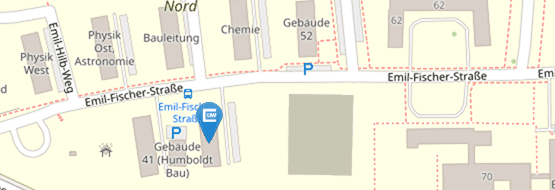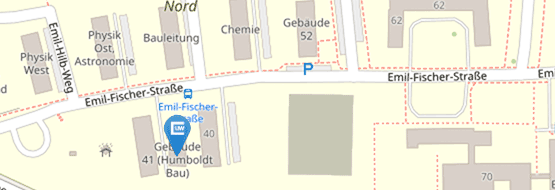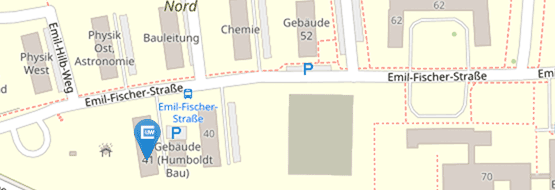Kathrin Hellmuth
Kathrin Hellmuth

- Kathrin Hellmuth, Christian Klingenberg, Qin Li, Min Tang
Numerical reconstruction of chemotaxis transition kernel
submitted (2024)
- Kathrin Hellmuth, Christian Klingenberg, Qin Li, Min Tang
Kinetic chemotaxis tumbling kernel determined from macroscopic quantities
SIAM Journal on Mathematical Analysis, vol. 56, no. 1, pp. 568-587 (2024)
- Kathrin Hellmuth, Christian Klingenberg
Computing Black Scholes with Uncertain Volatility—A Machine Learning Approach
Mathematics, vol. 10, no. 3, 489, special issue "Numerical Analysis with Applications in Machine Learning" (2022)
- Kathrin Hellmuth, Christian Klingenberg, Qin Li, Min Tang
Multiscale convergence of the inverse problem for chemotaxis in the Bayesian setting
Computation, vol. 9, no. 11, 119, special issue "Inverse Problems with Partial Data” (2021)
Conference proceedings:
- Kathrin Hellmuth, Christian Klingenberg, Qin Li
Multi-scale PDE inverse problem in bacterial movement
SEMA SIMAI Springer Series: Proceedings of HYP 2022 (2023)
- Kathrin Hellmuth
Inverse problems for kinetic equations - an application to chemotaxis
Oberwolfach Reports. Rep. 18 (2021), no. 3, pp. 2316–2318
- Kathrin Hellmuth
An inverse problem for chemotaxis
Oberwolfach Reports. Rep. 18 (2021), no. 2, pp. 1080–1083
Science communication:
- Kathrin Hellmuth, Christian Klingenberg
Route planning for bacteria
Snapshots of modern mathematics from Oberwolfach (2022), no.12
Various natural phenomena can be described using partial differential equations (PDEs). They often contain parameters that fit the general description of the phenomenon to a concrete situation. Reconstructing these parameters from experimental data is called the inverse problem and is necessary to fit the model and to enable prognosis.
I investigate such a parameter identification problem for a model of bacterial motion stimulated by a chemical signal (like a food source), which is called chemotaxis. It is often modelled by a kinetic chemotaxis equation in which a parameter encodes the bacterial reaction to the chemical signal. Supposing to be given velocity independent measurements of the bacteria density, photographies for instance, I study whether such data can contain enough information to recover the kinetic parameter. Furthermore, I study the relation between the reconstruction from the kinetic and a corresponding macroscopic Keller-Segel model.
| Winter term 2023/24 | Exercise sessions in Mathematics for Machine Learning (with Prof. Dr. Christian Klingenberg) |
| Winter term 2022/23 | Exercise sessions in Mathematics for Machine Learning (with Prof. Dr. Christian Klingenberg) |
| Winter term 2021/22 | Exercise sessions in Partial Differential Equations in mathematical Physics (with Prof. Dr. Christian Klingenberg) |
| Summer term 2021 | Exercise sessions in Linear Algebra 1 (with Prof. Dr. Komla Domelevo) |
| Winter term 2020/21 | Exercise sessions in Linearen Algebra 1 (with Prof. Dr. Sergey Dashkovskiy and Sandra Warnecke) |
| Winter term 2019/20 | Student teacher in Analysis 1 |
| since Oct. 2020 | PhD studies, Institute of Mathematics, University of Wuerzburg, Germany Advisor: Prof. Dr. Christian Klingenberg |
| Apr. 2020 | M.Sc. in Mathematics, University of Wuerzburg, Germany Erasmus+ semester at the university of Padua, Italy, in summer 2018 Master thesis: Computing the Black Scholes equation with uncertain volatility using the stochastic Galerkin method and a Bi-Fidelity approach Advisor: Prof. Dr. Christian Klingenberg |
| Oct. 2017 | B.Sc. in Mathematics, University of Wuerzburg, Germany |





